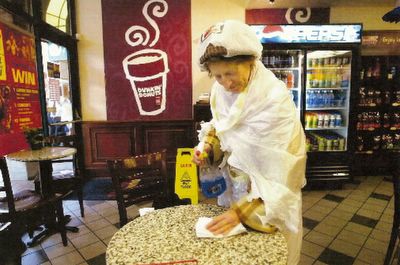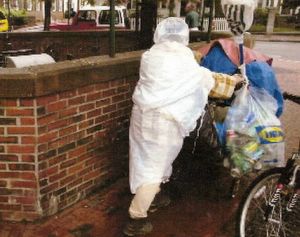
By David Abel | Globe Staff | 7/14/2003
CAMBRIDGE -- It's an annual rite of summer: Hundreds of homeless people leave city shelters to sleep on the streets, and everywhere, under bridges, in wooded areas, throughout the parks, are the mangy blankets, the empty beer bottles, and the trash they leave behind.
Natalie Hefflefinger, for one, can't stand the mess.
The petite 65-year-old spends her days singing in Harvard Square and her nights sleeping in a nearby park. Almost every evening, she takes the day's earnings to CVS, buys a box of trash bags - the good kind that don't break - and fills them to keep the parks clean. Sometimes, when she has enough change, she ambles along Mount Auburn and other area streets, dropping quarters in meters running low.
"It's a way to give something back," she said. "People think of the homeless as always taking from society. This is how I can thank society for letting me sleep in the parks."
One of scores of people who make the square their home, Hefflefinger doesn't want her adopted neighborhood to go to rot. Though the city has posted signs warning the homeless against sleeping in parks after dark, officials let many stay - especially those who help maintain them.
"If people store debris, sleeping bags, or build houses, we don't let that happen," said Lisa Peterson, commissioner of the city's Department of Public Works, which maintains more than 100 public spaces throughout Cambridge. "But some people can really surprise you."
The daughter of a gardener who grew up in a middle-class family in Malden, Hefflefinger has lived on the streets for years. She won't say how long, but her decaying teeth, scarred hands, and old, tattered boots attest to years of life without a home.
"Self-reliance isn't easy, but people have been very nice," she said, remembering the man who gave her $300 for cleaning up.
An artist who likes to draw landscapes - "I'm just an amateur," she said - and a singer with an interest in patriotic tunes - "I like to sing `America the Beautiful' " - the soft-spoken woman is one of the square's few homeless allowed to linger in local cafes.
She always pays for her coffee, and, after parking herself in a chair for a few hours, she pulls a bottle of Windex from her cart to wash off the table. She also tips.
"She's one of the most consistent tippers we have, always leaving behind a dollar," said Daniella Pinto, manager of the Dunkin' Donuts by the John F. Kennedy School of Government. "It's a pleasure to have her here."
Often, the cafes are the only shelter she has.
 On a recent morning, after waking in Longfellow Park to a downpour, she used some extra garbage bags to craft a raincoat, tied a plastic 7-Eleven bag to her head for a hood, and covered her overstuffed shopping cart with a blue tarp. After walking around for a while, a mop, rake, and buckets hanging off her cart, she stopped in one of her regular haunts for coffee and a jelly doughnut.
On a recent morning, after waking in Longfellow Park to a downpour, she used some extra garbage bags to craft a raincoat, tied a plastic 7-Eleven bag to her head for a hood, and covered her overstuffed shopping cart with a blue tarp. After walking around for a while, a mop, rake, and buckets hanging off her cart, she stopped in one of her regular haunts for coffee and a jelly doughnut."Harvard Square is a good place for me. I like books and art," she said.
Pressed, she widens her blue eyes and admits she wouldn't mind a place to live. "I'm not doing so great, but I'm not falling apart," she said in a gentle voice. "The mosquitoes are wicked now."
Married twice with five grown children, she had a messy breakup and doesn't keep in touch with her family, whom she last saw years ago when they lived in Nashua. "I'd rather not get into it," she said. "I'm not looking for any charity."
A former secretary and onetime waitress, Hefflefinger wants to earn her keep. And though she accepts donations - many of her clothes are presents from strangers - she always tries to give something back.
What would she want the most if she could have it? A replacement for the prescription glasses she lost, she said. For now, though, the nights are warm, and that, in itself, is good. She refuses to return to a shelter, she said, preferring the freedom of the outdoors.
On another recent day, with her mop of brown hair twisting in the evening breeze, she had little time to talk. She worked - ensuring that not a scrap of trash or any of last autumn's crinkled leaves remained in Longfellow Park.
After a few hours of tidying up, with dirt caked in her fingernails and sweat filling her craggy cheeks, she stood proudly over 11 white trash bags, the park looking its summer's best.
Two at a time, she carried the bags to a nearby sidewalk, stacking them for the garbage truck to take the next morning.
"This is just something I can do," she said. "It's my way, I guess, of saying thanks."
David Abel can be reached at dabel@globe.com.
Copyright, The Boston Globe

